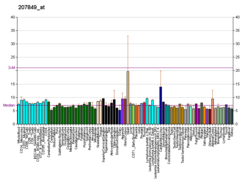白細胞介素-2
白細胞介素2 (英語:Interleukin 2,IL-2)是細胞因子中白細胞介素的一種,在免疫系統中起重要作用。它是一種蛋白質,負責調節白血球(白細胞,通常是淋巴細胞)的免疫活性。 IL-2的生成是機體受微生物感染時免疫應答的一部分,以區別「自己」與「非己」。IL-2通過與淋巴細胞表面的IL-2受體結合來發揮作用。
信號通路
編輯IL-2是擁有四個α螺旋束的細胞因子家族的一員,這一家族包括IL-4、IL-7、IL-9、IL-15和IL-21。IL-2的信號通過與之結合的IL-2受體傳導到胞內,IL-2受體是由α、β、γ三條鏈組成的異聚體,其中γ鏈為本家族所有IL的受體共有[6]。
當IL-2受體α亞基(IL-2RA)單獨存在時, 其與配體的親和力只有完整的IL-2受體(包含了β、γ亞基)的百分之一,β和γ亞基的參與對IL-2R參與T細胞的信號轉導是必要的[7]。
歷史
編輯發現
編輯作為免疫系統的一種水溶性分子,白細胞介素2是第一種被發現並被克隆的白細胞介素,其對應受體也是第一個被克隆並被解析結構的I型細胞因子受體。[8]:712
在1960年代中期,有研究報道了白細胞條件培養基中有促進淋巴細胞增殖的「活性因子」[9]:16。在1970年代中期,又發現了正常的人骨髓細胞可在某種條件性培養基中選擇性的使T細胞擴增,此條件性培養基用由植物血凝素刺激人正常淋巴細胞而來[8]:712。這其中的關鍵因子被稱為白細胞介素2,源自鼠細胞的白細胞介素2於1979年分離純化,人細胞源的分離純化於1980年[10]。在多個實驗室的激烈競爭中,人IL-2基因最終在1982年被克隆[11]:76。
應用
編輯IL-2的促免疫活性使得其在20世紀八九十年代成為一種有希望進入醫藥市場的免疫增強藥物。在1983年,Cetus公司製得了修飾重組的人IL-2蛋白(去掉了氨基端的丙氨酸,125號位的絲氨酸換為半胱氨酸)並冠以商品名Aldesleukin(後期改為Proleukin)[11]:76–77[12]:201[13]。此後,安進公司也進入了這一領域,製得了自己的重組/突變蛋白,很快兩家公司就對簿公堂,Cetus最終贏得了專利訴訟將安進逐出了此領域[11]:151。在1990年,Cetus的aldesleukin獲得了九個歐洲國家的批准,但是在同年,美國食品藥品監督管理局(FDA)拒絕了Cetus的aldesleukin上市申請[14]。這一失利導致了Cetus公司的破產,並於1991年被Chiron公司收購[15][16]。此後,Chiron公司繼續開發IL-2,並在1992年以Proleukin為商品名獲得了FDA的批准,用以治療轉移性的腎細胞癌[17]。
截止1993年,Proleukin仍是唯一獲得批准的IL-2藥物,但此時羅氏公司也開發了自己的修飾的IL-2(在氨基端增加了甲硫氨酸)商品名為teceleukin,Glaxo公司也發展的新藥bioleukin,在氨基端增加了甲硫氨酸,125號殘基替換為丙氨酸。此後,又有數十種基於IL-2及聯合其它免疫因子的病人血細胞刺激回輸方法被開發出來[13][18]。
參考文獻
編輯- ^ 與白细胞介素-2相關的疾病;在維基數據上查看/編輯參考.
- ^ 2.0 2.1 2.2 GRCh38: Ensembl release 89: ENSG00000109471 - Ensembl, May 2017
- ^ 3.0 3.1 3.2 GRCm38: Ensembl release 89: ENSMUSG00000027720 - Ensembl, May 2017
- ^ Human PubMed Reference:. National Center for Biotechnology Information, U.S. National Library of Medicine.
- ^ Mouse PubMed Reference:. National Center for Biotechnology Information, U.S. National Library of Medicine.
- ^ Liao W, Lin JX, Leonard WJ. IL-2 family cytokines: new insights into the complex roles of IL-2 as a broad regulator of T helper cell differentiation. Current Opinion in Immunology. October 2011, 23 (5): 598–604. PMC 3405730 . PMID 21889323. doi:10.1016/j.coi.2011.08.003.
- ^ Gaffen SL, Liu KD. Overview of interleukin-2 function, production and clinical applications. Cytokine. November 2004, 28 (3): 109–23. PMID 15473953. doi:10.1016/j.cyto.2004.06.010.
- ^ 8.0 8.1 Paul WE. Fundamental immunology 6th. Philadelphia: Wolters Kluwer/Lippincott Williams & Wilkins. 2008. ISBN 978-0-7817-6519-0.
- ^ Chavez AR, Buchser W, Basse PH, Liang X, Appleman LJ, Maranchie JK, Zeh H, de Vera ME, Lotze MT. Pharmacologic administration of interleukin-2. Annals of the New York Academy of Sciences. December 2009, 1182: 14–27. PMID 20074271. doi:10.1111/j.1749-6632.2009.05160.x.
- ^ Welte K, Wang CY, Mertelsmann R, Venuta S, Feldman SP, Moore MA. Purification of human interleukin 2 to apparent homogeneity and its molecular heterogeneity. The Journal of Experimental Medicine. August 1982, 156 (2): 454–64. PMC 2186775 . PMID 6980256. doi:10.1084/jem.156.2.454.
- ^ 11.0 11.1 11.2 Rabinow P. Making PCR: A story of biotechnology Paperback. Chicago, IL, USA: University of Chicago Press. 1997. ISBN 978-0226701479.
- ^ Hugo Almeida. Drugs obtained by biotechnology processing (頁面存檔備份,存於網際網路檔案館) Brazilian Journal of Pharmaceutical Sciences apr/jun 2011 47(2):199-207
- ^ 13.0 13.1 Whittington R, Faulds D. Interleukin-2. A review of its pharmacological properties and therapeutic use in patients with cancer. Drugs. September 1993, 46 (3): 446–514. PMID 7693434. doi:10.2165/00003495-199346030-00009.
- ^ Pollack A. Cetus Drug Is Blocked By F.D.A.. New York Times. July 31, 1990 [2017-06-25]. (原始內容存檔於2020-09-28). This source mentions approval in 9 European countries.
- ^ 2 Biotech Pioneers To Merge. New York Times. July 23, 1991 [2017-06-25]. (原始內容存檔於2021-12-02).
- ^ Lehrman S. Cetus: A Collision Course With Failure. The Scientist Magazine. January 20, 1992 [2022-01-18]. (原始內容存檔於2016-08-05).
- ^ Dutcher JP. Current status of interleukin-2 therapy for metastatic renal cell carcinoma and metastatic melanoma. Oncology. November 2002, 16 (11 Suppl 13): 4–10. PMID 12469934.
- ^ D02749 (Teceleukin). KEGG drug. (原始內容存檔於2021-11-01).





